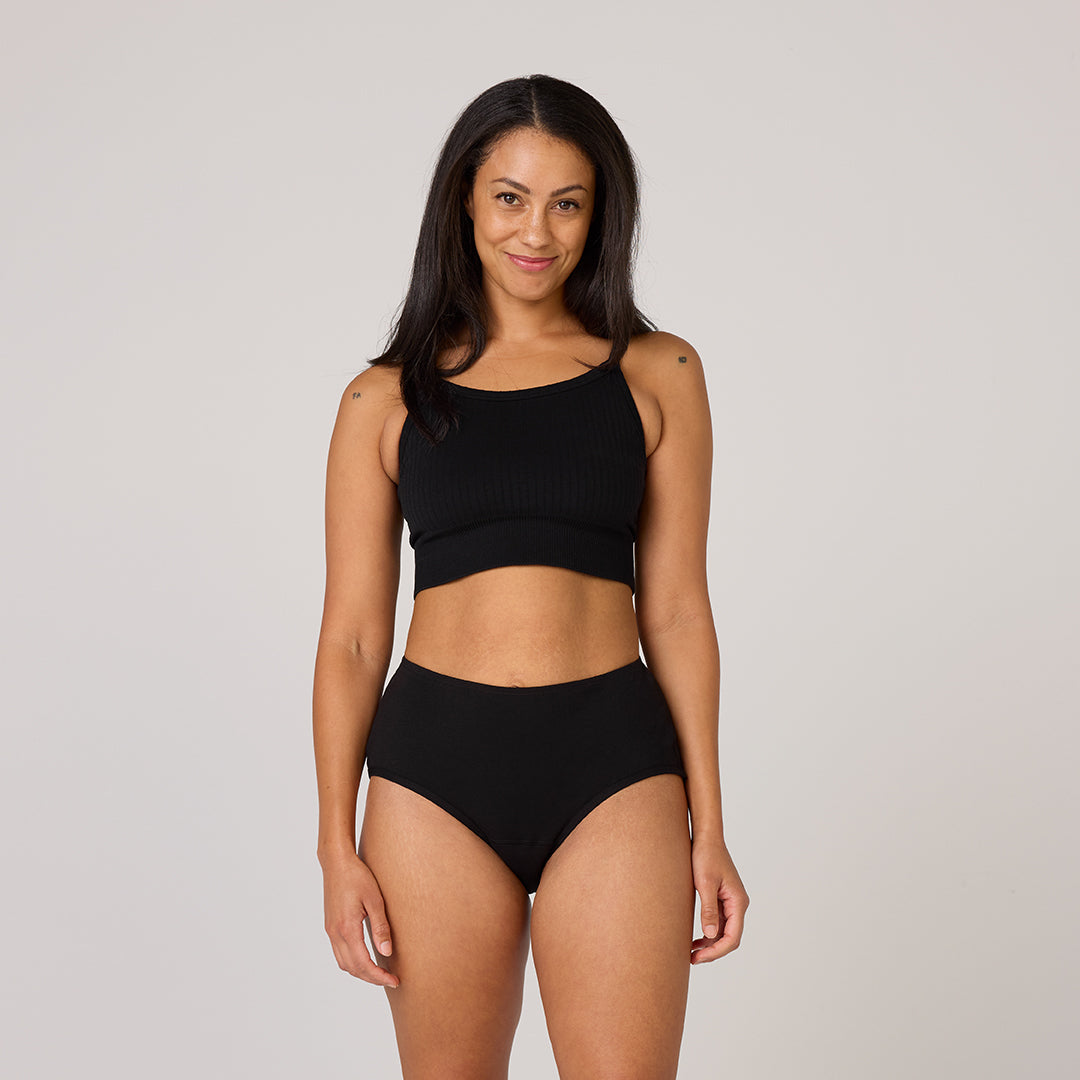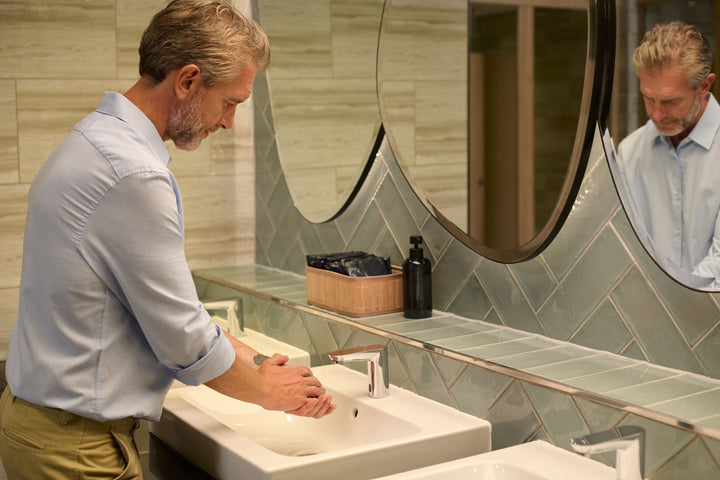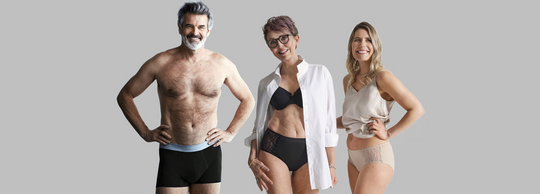When we think of menopause, we usually think of symptoms like hot flushes, mood swings, and night sweats. However, this change in our lives can also impact other parts of our bodies that we might not expect, such as our hair, skin, and nails. Understanding why these changes are happening and how they can be managed effectively can make a big difference.
We'll explain how and why these changes happen and offer a few helpful tips for managing them to keep your hair, skin and nails healthy and looking their best.
What is menopause?
In simple terms, menopause is when you stop ovulating because of a drop in the levels of oestrogen and progesterone (your reproductive hormones) in your body. This change can cause you to develop some symptoms while your body goes through the process of ending your menstrual cycle.
Menopause happens in three stages:
- Perimenopause - This is your body’s way of getting ready for menopause. Hormone levels start to drop, and your periods might become irregular.
- Menopause - This is when you stop ovulating, leading to your periods stopping completely. You're considered to be in menopause when you haven't had a period for 12 months.
- Postmenopause - After you’ve gone 12 months without a period, you enter the postmenopausal stage.
Every journey is different when it comes to when you will go through these stages and how they will affect you. You might not have any symptoms, or you may experience a few, one of which being urinary incontinence. Luckily, you can keep light leaks locked in while supporting your hair, skin and nails with our washable incontinence underwear and supplement bundle . Changes to your hair, skin and nails can occur at any of these three stages, so it's important to understand these changes and what to look out for.
How does menopause affect your hair, skin and nails?
Your hair, skin and nails all have something important in common — a protein called collagen. Collagen does a lot of heavy lifting in your body, supporting not just your hair, skin, and nails but also your cartilage and bones.
The amount of collagen your body produces is dependent on your levels of oestrogen. So, when your oestrogen levels drop during menopause and naturally as you get older, your hair, skin and nails might lose elasticity and become weaker and more brittle.
How does menopause affect your hair?
You might notice these changes to your hair during menopause:
- Your hair might start thinning or shedding. This occurs because androgen levels (the hormone that can cause hair loss) increase during menopause.
- It might become more dry or brittle because your scalp is producing less oil, and natural oils are essential for healthy hair.
- Hair texture can change too, sometimes becoming finer or less manageable. Interestingly, straight hair you’ve had for most of your life might suddenly develop curls, or curly hair could loosen and become straighter.
- Your hair colour and tone might change because of a decrease in melanin production (the pigment that gives your skin, hair and eyes their colour). This means you might start to notice grey or white hair, or that your natural colour isn't as vibrant.
How does menopause affect your skin?
Common changes to your skin during menopause include:
- You might notice your skin isn't as plump and firm.
- Your skin might feel dry and more sensitive than you're used to.
- You could develop fine lines, wrinkles, and a more uneven tone or texture.
- Your intimate skin can be affected too, becoming more delicate and dry through menopause.
How does menopause affect your nails?
- Your nails might be more prone to splitting or breaking.
- They might grow more slowly than you're used to.
- The texture of your nails could change over time, for example you might notice small ridges in your nails.
But it’s important to remember that these shifts and changes are a natural part of your body’s transition — and there are ways to nurture and care for yourself through it all.
How you can keep your hair, skin and nails healthy during menopause
Just like with most symptoms of menopause, there are ways to manage them, and changes to your hair, skin and nails is no exception. Here are a few tips for how to keep them healthy and strong throughout menopause and beyond:
Consider taking hair, skin and nails supplements
Taking supplements can be a great way to give your body a boost in any key nutrients and vitamins it might be lacking. Luckily, you can find supplements that take care of your hair, skin and nails all at once! Better still, you can even find these supplements in chewable gummy form in different flavours, like eating a sweet that's good for you too.
Since menopause often comes with other changes, like bladder sensitivity, it’s important to feel supported in all aspects of your wellbeing. Light leaks are common during this stage of your life, that’s why we’ve partnered with Issviva to create our menopause bundles . You can find a choice of three different menopause supplements (including hair, skin and nails gummies ) paired with discreet, comfortable reusable incontinence pants , to help you feel your best inside and out.
The Issviva Hair, Skin & Nails Food Supplement contains a blend of vitamins, minerals and nutrients designed to help you achieve radiant skin, healthy hair and strong nails during menopause. Here's a closer look at these key ingredients:
- Collagen - taking supplements with collagen help make up for your body not producing as much of it due to drops in hormone levels. Collagen is also an essential part of the production of another important protein, keratin, a protective shield that prevents damage to your hair, skin and nails. [1]
- Biotin - also called Vitamin B7, biotin keeps your hair follicles (the little holes where your hair grows from) healthy to support hair growth and strength. [2]
- Hyaluronic acid - a common ingredient in skincare, this acid is known for its ability to lock moisture into your skin to keep it plump and firm (it can hold up to 1000 times its weight in water, which is pretty incredible). [3]
- Vitamin C - a powerful antioxidant that is great for your overall health, but also boosts natural collagen production. [4]
- Vitamin A - Vitamin A has a number of benefits for your hair, skin and nails, mainly repairing damaged skin cells and increasing the production of natural oils in your scalp, keeping your hair healthy and shiny. However, too much Vitamin A can actually have the opposite effect, so be sure to monitor dosages carefully. [5]
- Selenium - this mineral helps support the production of new hair follicles, protects your skin from damage and helps prevent nail breakage. [6]
Before starting any new supplements, it’s always a good idea to check in with your doctor to make sure they’re the right fit for you.
Make changes to your diet
The vitamins and nutrients in supplements can also be found in everyday foods, so if taking supplements isn't the route for you, some simple changes or additions to your diet could be an option.
To give your body a boost of biotin, try adding some whole grains like brown rice and oats to your daily diet to keep your nails strong. To keep your hair strong and shiny, give eggs, lean meat and leafy greens a go for extra protein. [7] For your skin, a combination of vitamin C and Omega-3 fatty acids will go a long way. You can find these in foods like fruits, nuts and avocados. [8]
As with starting new supplements, check in with your doctor before making any major new changes to your diet.
Self-care is essential
From physical changes to the emotional impact, it's important to look after yourself and listen to what your body needs during menopause. Self-care rituals are a great way to help you feel pampered and relaxed, you can even get some friends together for a face mask or two.
Here are a few things you use to create a self-care routine that's kind to your body and mind, especially your hair, skin and nails:
Create a skincare routine that works for you
Keeping your skin hydrated and healthy using skincare doesn't have to be complicated or expensive, you just need to look out for some of the same ingredients that you can find in supplements and some foods, including:
- Hyaluronic acid
- Vitamin C
- Ceramides
It's important to protect yourself from sun damage too, so investing in a sunscreen with a high sun protection factor (SPF), even when it's not sunny, is the key to maintaining healthy skin.
Adjust your haircare routine
As your hair changes during menopause, it might have different needs than what you're used to.
Here's a few quick tips for hair health during menopause:
- Use gentle, sulfate-free hair washing products (sulfates are great for keeping your hair clean, but can make it dry and brittle).
- Avoid excessive heat styling and use a heat protectant when you do.
- Get your hair trimmed regularly to prevent split ends and hair breakage.
- Consider getting some advice from a hairdresser to help you feel your most confident.
- Wind down with a weekly hair mask to keep your hair hydrated and healthy.
Find ways to get moving that you enjoy
Exercise is another way to improve your overall health, and while it might not seem like the two are connected, it's a great way to keep your hair, skin and nails healthy too.
Exercise improves your circulation and blood flow, which helps deliver nutrients and oxygen around your body more effectively. This can in turn improve cell regeneration in your skin and allow oxygen to reach your hair follicles, promoting hair growth.
When it comes to exercise, it's important to choose something you enjoy doing, you don't need to run a marathon to get active. You could try a dance workout with some friends or even just go on a walk in nature, any way you can get a bit of movement into your daily routine will work!
Learn ways to manage your stress levels
Stress can negatively impact our bodies and minds in many ways, including your hair, skin and nails. Stress hormones can break down the collagen in your body, which can cause more fine lines and wrinkles and can contribute to hair thinning and hair loss during menopause. These stress hormones can also aggravate conditions you may already have such as eczema or psoriasis. [9]
The stresses of everyday life coupled with going through the emotional rollercoaster of menopause can be challenging. So, finding a way to release some of your pent-up emotions can be a great way to improve your overall wellbeing.
Stress relief looks different to everyone, it could be something as simple as meditation or breathing exercises, or picking up a new hobby. If you're struggling to deal with stress and other difficult feelings, reaching out to loved ones, friends and family for support may help ease your mind.
Menopause brings many changes to your body, and while some of them — like thinning hair, dry skin, and brittle nails — may feel challenging, they’re a natural part of this life stage. With the right care, you can support your body and feel confident in your skin. From nourishing your hair, skin, and nails with targeted supplements to staying active, hydrated and eating a balanced diet, every little step helps. Throughout your menopause journey, it can feel like you're juggling multiple changes at once. That's where our incontinence underwear and supplement bundles come in, helping you feel your best no matter what these changes throw at you. TENA can help you keep up with all these changes and keep you feeling confident throughout menopause and beyond. Shop the TENA Issviva incontinence underwear and hair skin and nails bundle to lock in light leaks while keeping your hair, skin, and nails nourished and protected.
Menopause can have an impact on your sleep too. Discover why these changes happen and how to get a good nights rest in our guide to menopause and sleep .
References:
[1] https://www.webmd.com/vitamins-and-supplements/news/20240408/collagen-supplements-for-skin-hair-nails-what-to-know
[2] https://health.clevelandclinic.org/is-biotin-as-good-as-advertised-for-your-hair-loss
[3] https://www.health.harvard.edu/blog/the-hype-on-hyaluronic-acid-2020012318653
[4] https://www.healthline.com/health/ways-to-boost-collagen
[5] VanBuren CA, Everts HB. Vitamin A in Skin and Hair: An Update. Nutrients. 2022 Jul 19;14(14):2952. doi: 10.3390/nu14142952. PMID: 35889909; PMCID: PMC9324272.
[6] https://www.selenium.ie/skin-hair-nails/
[7] https://www.healthline.com/nutrition/foods-for-hair-growth
[8] https://www.healthline.com/nutrition/12-foods-for-healthy-skin
[9] https://www.aad.org/news/stress-shows-in-skin-hair-nails









